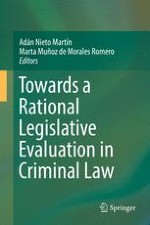2016 | OriginalPaper | Chapter
6. Criminal Policy Evaluation and Rationality in Legislative Procedure: The Example of Sweden
Author : Manuel Maroto Calatayud
Published in: Towards a Rational Legislative Evaluation in Criminal Law
Publisher: Springer International Publishing
Activate our intelligent search to find suitable subject content or patents.
Select sections of text to find matching patents with Artificial Intelligence. powered by
Select sections of text to find additional relevant content using AI-assisted search. powered by
